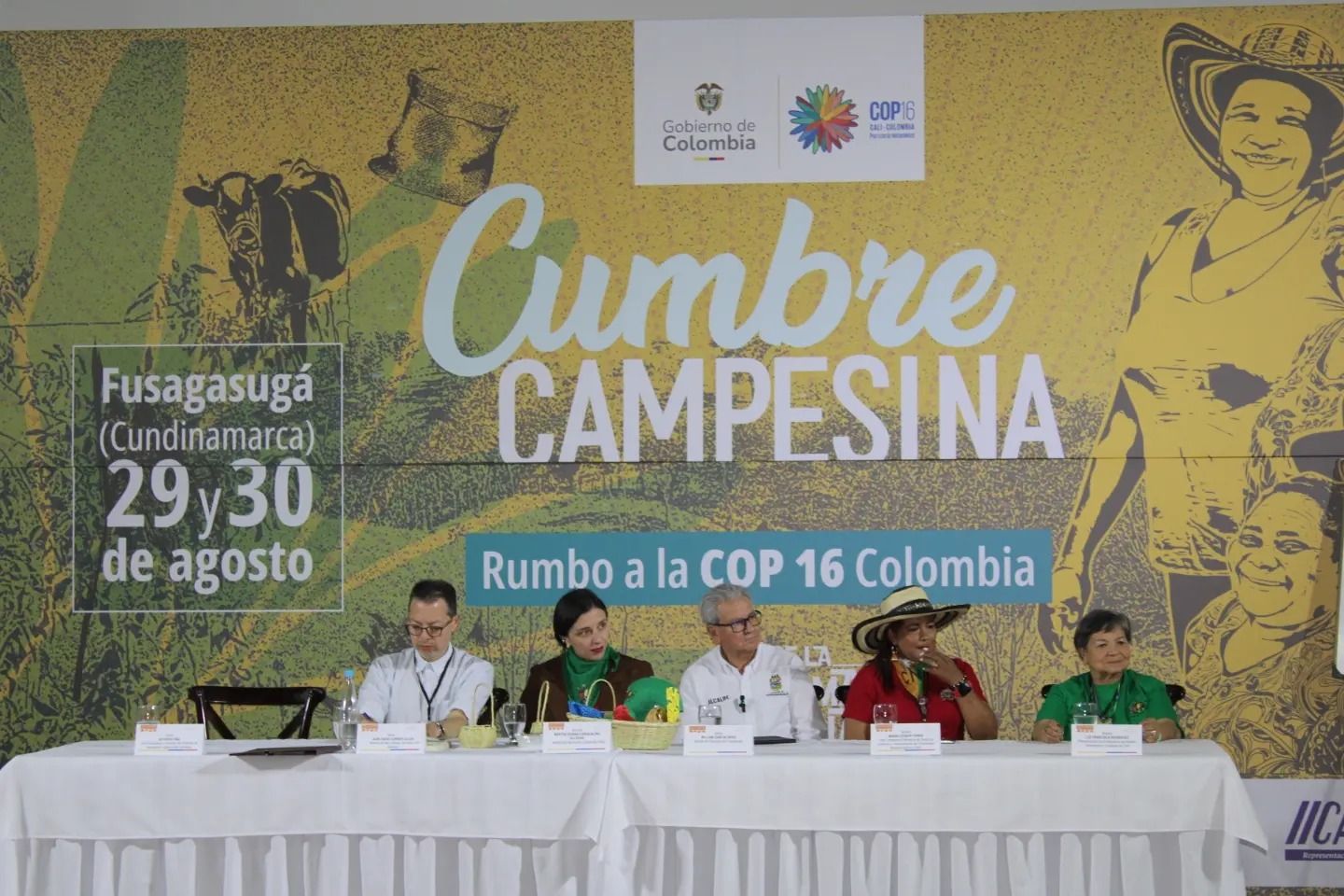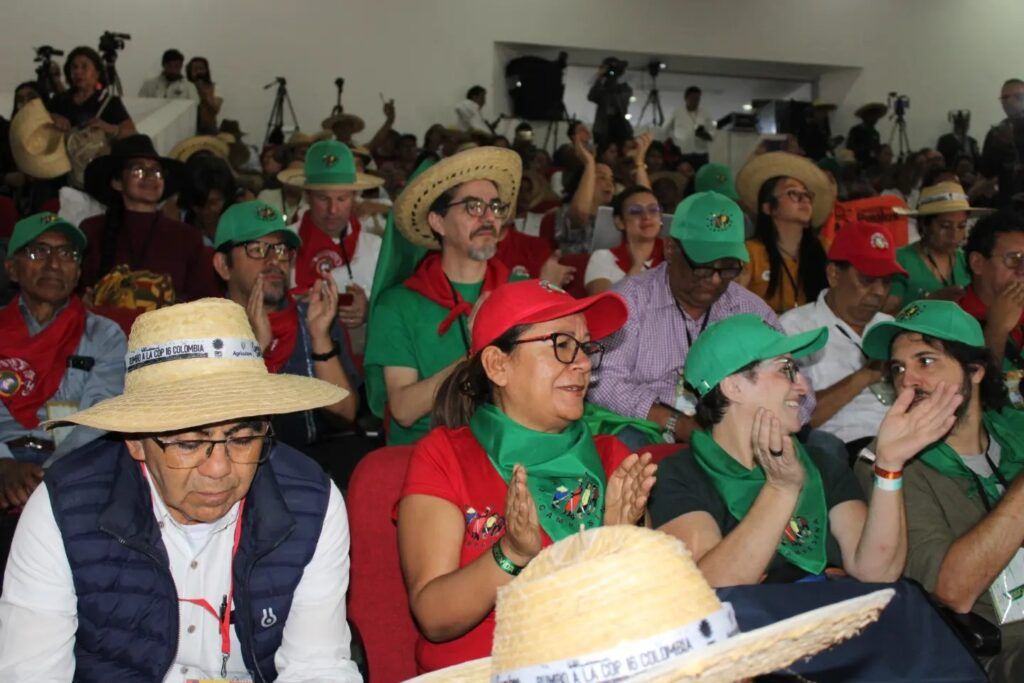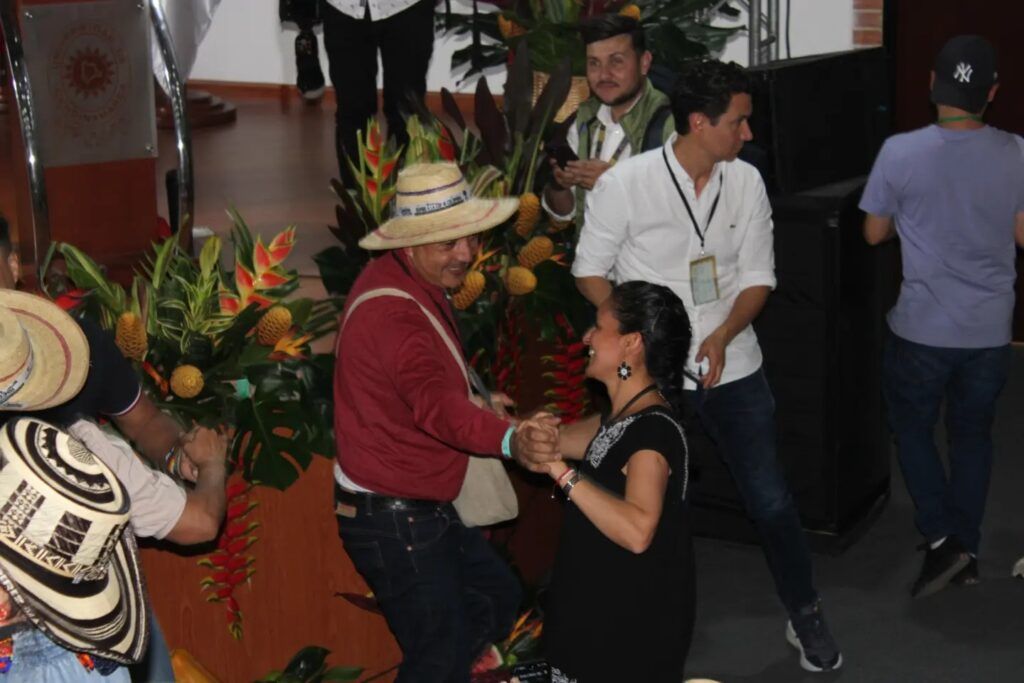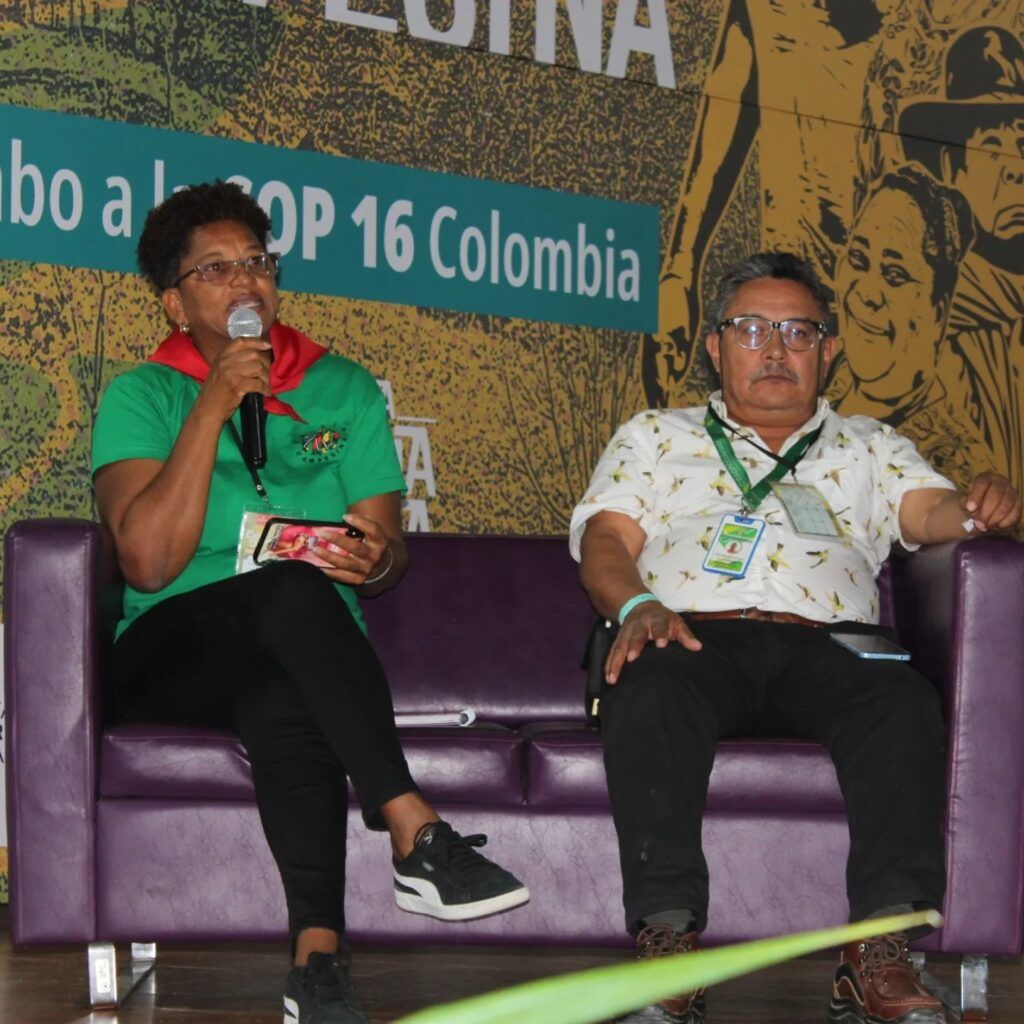Colombia: Declaration from the Peasants’ Summit as preparations for Biodiversity COP16 gather pace

On 29 and 30 August, in the run-up to the 16th Conference of the Parties to the Convention on Biological Diversity (COP16), to be held in Cali later this year, a delegation from La Via Campesina was present at the Peasant Summit in Fusagasugá, Cudinamarca, Colombia. We produce below the full text of the Declaration from the Summit.
As caretakers, protectors, and nurturers of life, Colombian and international peasant organizations, gathered at the Peasant Summit towards COP16 in Fusagasugá, Cundinamarca, Colombia, declare the following to the Colombian Government, the Colombian people, and the global community:
We recognize the initiative of the Colombian Government in responding to the demands of the peasant movement, fishing communities, and those who protect common goods. Driven by this, the Peasant Summit was organized to highlight the global situation of peasants within the broader context of international discussions on environmental care, the fight against climate crisis, and biodiversity conservation.
In Light of the Colombian Situation
- We call for an end to human rights violations and the national and international militarization of peasant territories, in the defense of biodiversity and ecosystems.
- We reject militarism, persecution, criminalization, and institutionalized terrorism carried out in the name of conservation, including the case of the Gorgona Island military base, among others.
- The Colombian peasantry clearly highlights the following: Without integral and popular agrarian reform, there can be no care for the environment or for strategic ecosystems for life such as páramos, the Andean-Amazonian connection, the Biogeographic Pacific, and the Orinoquía. Land and water restitution and democratization, the restoration of water bodies and soil health, as well as fishing and agromining peasantry, are all essential components of actions towards integral and popular agrarian reform and environmental protection.
- We demand that the Colombian State recognize the territorial environmental dimension of the peasantry on an equal footing with other constitutionally protected populations to achieve the harmonization of rights. This recognition should be reflected in specific legislation, public policy, and management tools that ensure the presence of peasants in areas of special environmental interest under dignified conditions, with land use plans that respect their ways of life, promote sustainable development, and improve environmental management in peasant communities.
- We call on the State to take concrete action to address the negative impact of large-scale landholdings and monoculture farming on biodiversity.
- It is necessary to prioritize food sovereignty based on agroecology by strengthening short food supply chains at the local, regional, and national levels.
- We urge the Colombian State and Colombian people to engage in an honest and democratic debate on the need for expropriation within the framework of agrarian jurisdiction, land democratization, and the ecological and social function of property. A democratic national project should settle this debate.
- We demand that the Colombian State develop participatory, community-based, and intercultural tools for environmental and ecological care. These tools must be designed to avoid harmful actions and local territorial disputes, particularly those arising at the moment between communities with special constitutional protection and a strong commitment to biodiversity, as exemplified by Decree Law No. 1094 of 2024.
- We reaffirm that the peasantry has a strong connection to the land and environment, which must be recognized, supported, and protected by all levels of the Colombian Government and State.
- The historical role of the peasantry in caring for, protecting, and safeguarding biodiversity and common goods in the country must be guaranteed, recognized, and highlighted.
- We reassert that there can be no discussion about environmental care and ecosystem protection without recognizing the pivotal and strategic role of peasants in the struggles for food sovereignty.
- We highlight the need for Colombia’s Ministry of Environment and Sustainable Development to commit to guaranteeing the protection of peasant communities, their work practices, autonomy, culture, and environmental and territorial capacity. These actions should include a structural reform of the scheme and operation of the Regional Autonomous Corporations, as well as involve the peasantry in the management, design, implementation, and evaluation of environmental management plans for protected areas.
- We urge the Ministry of Agriculture to promote this declaration as a binding element in existing public policy, to advance in the strengthening of the peasant movement and the defenders of common goods and counteract the global model of agribusiness and extractivism.
- We reject the conceptual, political, environmental, and economic framework underpinning biodiversity conservation discussions that view nature as a commodity.
- We advocate for the exchange of knowledge, the transfer of sovereign and democratic technologies, community-based management of traditional knowledge, innovation rooted in peasant practices, and the efforts to preserve and reproduce their ways of life.
Strengthening peasant life requires society’s full engagement in the fulfilment of the Peace Agreement and its commitments with the peasant movement, as well as the consolidation of Total Peace through political dialogue aiming at resolving the domestic armed conflict.
Therefore, we, as peasants, reaffirm the urgent need for a binding, concerted, and progressive drug policy, based on a targeted, territorial, human rights-based, and non‑stigmatizing approach, which allows us to overcome the phenomenon of so-called illicit crop cultivation in peasant territories.
A realistic conversation about environmental protection, food production, and ecosystem care is impossible while there is war and social injustice. We call on President Gustavo Petro to lead an international discussion and bring these peasant proposals to the COP16 stage, to highlight their place in environmental protection and the need for a political framework that recognizes them.
Regarding the Demands for COP16 in the Global Context
As peasant organizations in Colombia and Latin America, we have a long history of defending the fundamental rights of peasants and supporting the voices of indigenous peoples, ancestral communities, coastal communities, women, intercultural territories, migrant populations, children, and youth from all backgrounds. We champion food sovereignty, highlighting peasant agriculture, agroecological production, solidarity-based social economies, the protection of common goods and biodiversity. All of them are essential for fostering healthy diets in balance with nature, through the work of cooperatives, peasant reserves, and Indigenous territories. These ideas arise in the face of the global agenda of agribusiness and extractivism.
In the context of the climate crisis and the threat of biodiversity loss, we call for recognition of peasants’ pivotal role in preserving biodiversity and protecting common goods, especially given the lack of social and climate justice in current global approaches.
We demand respect for the traditional knowledge of the peasantry associated with biodiversity. The inclusion of traditional peasant worldviews in political decision-making is crucial, as they are currently overlooked despite the inclusion of Indigenous ancestral communities.
Given our deep knowledge of the ethical management of common goods and our capacity for agency and autonomy, we demand that the leading role of peasants and other non-market local organizations be recognized in decision-making processes on biodiversity, stemming from the crucial role in providing real solutions to the climate crisis and biodiversity preservation.
The extractivist models of the agro-industrial system are the main culprits of biodiversity loss and the climate crisis. These corporate-driven systems not only damage the environment but also undermine the cultures and livelihoods of peasant, traditional, tribal, Afro-descendant, Palenquera, and Indigenous communities, which are on the frontline defending common goods, especially the often-overlooked peasant communities.
The creation of “offsets” or “biodiversity credits” as solutions, promoted by billionaires and corporate financial institutions, is a mechanism that allows wealthy nations to bypass regulations and avoid addressing the root causes of biodiversity loss, shifting their responsibility and paying others to repair the damage they have caused.
As peasants, we demand that the underlying causes of the crisis be addressed through effective regulations, such as those advocated for by defenders of commons. We also call for a ban on commercial projects that harm natural algal ecosystems, including genetically modified algae and any form of geoengineering that threatens biodiversity.
We challenge the approach of the Convention on Biological Diversity (CBD), which overlooks the crucial role of peasants and fishers in sustainable management of natural common goods. Its utilitarian, economistic, and anthropocentric perspective fails to address biodiversity loss comprehensively.
We firmly reject the development of genetic engineering and synthetic biology technologies, as well as the use of digital sequence information (DSI) and the patents derived from it. These technologies represent ultimately a form of privatization and manipulation of life in which corporations seek to obtain huge profits. By causing severe and unpredictable distortions to natural genomes, they threaten traditional and peasant food production and undermine biodiversity.
For all of the above, we reject the false “nature-based” solutions promoted by corporate interests as part of the “greenwashing.” This term has been used to describe how governments, politicians, and corporations promote processes that simulate a supposed “genuine commitment” to the environment or sustainability, but which, in reality, are superficial, insufficient, or even counterproductive measures.
This undermines public trust in genuine restoration and climate repair initiatives, while making it difficult to implement effective environmental and climate policies. An urgent path of climate justice and repair is needed to address structural inequalities and corporate responsibilities.
Climate justice focuses on justice, equity, and human rights, advocating for reparation and compensation for communities impacted by climate change and biodiversity loss. It emphasizes the need to strengthen intergenerational dialogue, cultural diversity, and traditional knowledge, particularly among the most affected groups, such as youth, rural women, and fisherfolk.
Furthermore, we highlight once again that social and climate justice are impossible without gender justice for peasant women. Therefore, we demand the establishment of a policy for access to land for rural women from all backgrounds. By guaranteeing the participation of peasant women in economic, political, social, and environmental decision-making, we can effectively achieve climate justice in key populations, especially those affected by the climate crisis.
We insist on the defense and protection of environmental defenders against human rights abuses, stigmatization, and criminalization of peasants. This requires public policies that protect and advocate for the role of defenders and peasants, as well as the creation of support funds and the implementation of a just transition towards agroecological production, low-carbon economies, on the basis of models of peasant, social, and solidarity-based economies.
It is essential that governments, especially the Colombian Government, promote concrete and targeted actions to guarantee climate justice and reparation, providing effective solutions to the most affected populations, including us, the world’s peasant communities.
Finally, our concrete proposal to the Colombian Government, within the framework of COP16, is to adopt and support the peasant vision by establishing a Subsidiary Body to work with other key populations in permanently respecting, preserving, and maintaining the knowledge, innovations, and practices of communities defending common goods, for the protection and sustainable use of biodiversity, in accordance with Article 8j of the Convention on Biological Diversity.
Additionally, we call on the Colombian Government to request at COP16 that the United Nations Declaration on the Rights of Peasants and Other People Working in Rural Areas be recognized as a framework for interpreting and implementing the Convention on Biological Diversity, especially Articles 19 and 20.
We demand greater peasant involvement in the design, implementation, and evaluation of the biodiversity action plan to be presented at COP16.
The Colombian Government plays a key role in developing participatory, community-based, and intercultural, environmental and ecological management tools that facilitate the exchange of knowledge among different scientific disciplines, including the contributions of academic institutions at the service of rural communities. These actions aim at recognizing the leading role of those on the front lines of defending common goods and biodiversity.
The above seeks to establish minimum conditions for international agreements among peoples, particularly peasants as subjects of rights, recognizing their diversity, territorial particularities, and cultural specificities, such as the development of biocultural heritage.
Therefore, it is crucial that representatives of our peasant organizations be included as part of the official Colombian delegation at COP16 in the decision-making space, ensuring our autonomy as peasants.







